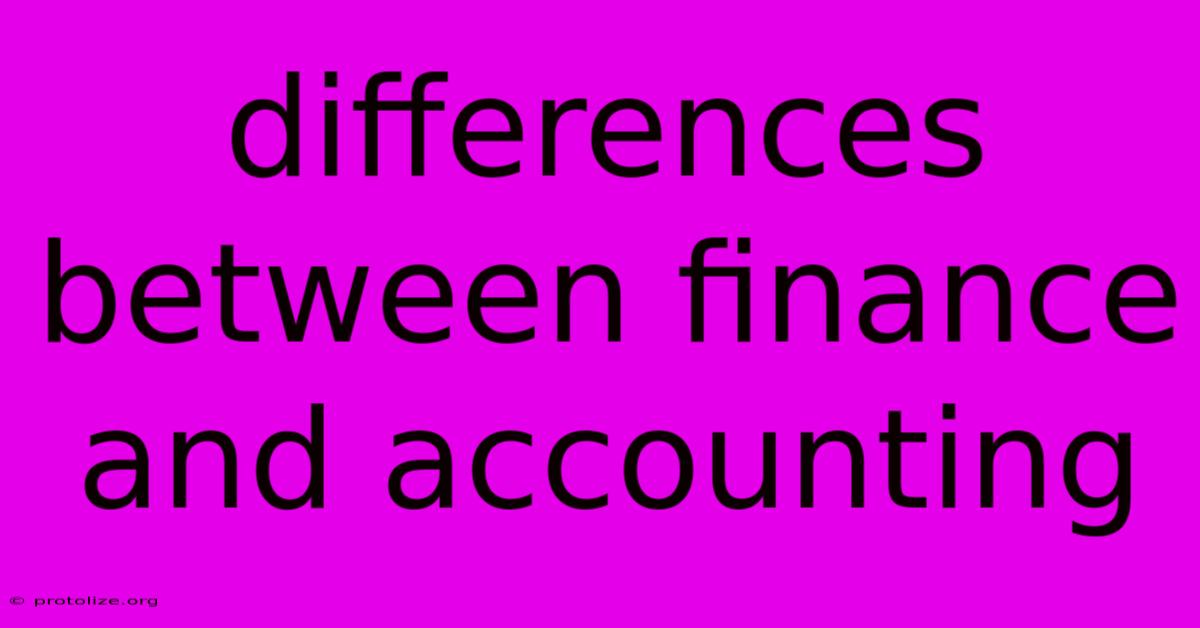Differences Between Finance And Accounting

Discover more detailed and exciting information on our website. Click the link below to start your adventure: Visit Best Website mr.cleine.com. Don't miss out!
Table of Contents
Finance vs. Accounting: What's the Difference?
Finance and accounting are often used interchangeably, but they are distinct disciplines with different focuses and goals. Understanding their key differences is crucial for anyone pursuing a career in either field or simply seeking to improve their financial literacy. This article will delve into the core distinctions between finance and accounting, clarifying their roles and responsibilities within an organization.
What is Accounting?
Accounting is primarily concerned with recording, classifying, summarizing, and interpreting financial transactions. It's the systematic process of tracking an organization's financial activities. Think of it as the meticulous record-keeping system that provides a detailed history of a company's financial health.
Key Functions of Accounting:
- Financial Reporting: Creating financial statements like balance sheets, income statements, and cash flow statements. These reports provide a snapshot of a company's financial position at a specific point in time and its performance over a period.
- Auditing: Verifying the accuracy and reliability of financial records. Internal audits are conducted by a company's own employees, while external audits are performed by independent firms to ensure compliance with accounting standards.
- Tax Compliance: Preparing and filing tax returns, ensuring adherence to tax laws and regulations.
- Budgeting: Creating and managing budgets to plan and control spending.
What is Finance?
Finance, on the other hand, focuses on managing money and capital. It uses the information provided by accounting to make strategic decisions about how to allocate resources to maximize value. Finance is about the future – using financial data to predict and plan for future opportunities and challenges.
Key Functions of Finance:
- Investment Management: Analyzing and selecting investments, managing portfolios, and optimizing returns. This includes decisions related to stocks, bonds, real estate, and other assets.
- Corporate Finance: Making decisions about capital structure, raising capital, and managing financial risk. This involves activities like issuing bonds, securing loans, and managing debt.
- Financial Planning: Developing long-term financial strategies for growth and sustainability. This includes forecasting, budgeting, and risk management.
- Financial Analysis: Evaluating financial performance, identifying trends, and making recommendations for improvement.
Key Differences Summarized:
| Feature | Accounting | Finance |
|---|---|---|
| Primary Focus | Recording and reporting financial data | Managing money and capital |
| Time Orientation | Primarily historical (past transactions) | Primarily future-oriented (planning & forecasting) |
| Main Goal | Accurate and reliable financial records | Maximizing value and achieving financial goals |
| Typical Activities | Bookkeeping, auditing, tax preparation | Investment analysis, capital budgeting, financial modeling |
| Decision-Making | Supports decision-making by providing data | Drives decision-making through financial strategies |
Overlapping Areas:
While distinct, finance and accounting do overlap. Accountants provide the financial data that finance professionals use for decision-making. A strong understanding of accounting principles is essential for anyone working in finance.
Choosing a Career Path:
The choice between a career in finance and accounting depends on your interests and skills. If you enjoy detail-oriented work and ensuring accuracy, accounting might be a good fit. If you are more interested in strategic decision-making and managing risk, finance might be a better option. Both fields offer rewarding careers with excellent growth potential.
Conclusion:
In essence, accounting provides the historical financial data, while finance uses that data to plan and manage future financial activities. They are two sides of the same coin, working together to ensure the financial health and success of any organization. Understanding this fundamental difference is key to navigating the complex world of business and finance.

Thank you for visiting our website wich cover about Differences Between Finance And Accounting. We hope the information provided has been useful to you. Feel free to contact us if you have any questions or need further assistance. See you next time and dont miss to bookmark.
Featured Posts
-
Uown Finance
Dec 16, 2024
-
Chatgpt Finance Use Cases
Dec 16, 2024
-
Dyess Finance
Dec 16, 2024
-
Used Cars For Finance No Credit
Dec 16, 2024
-
Viva Finance Reddit
Dec 16, 2024
